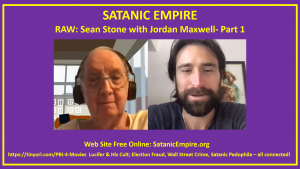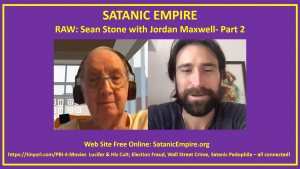This interview has two parts.


Phi Beta Iota: We started thinking about religious counterintelligence in 2003, after reading Robert Maxwell, Israel's Superspy: The Life and Murder of a Media Mogul, at which point we concluded that we not only needed an FBI division for commercial counter-espionage, but a religious division as well, one able to track not just Islamic support to terrorism, but Jewish, Catholic, Mormon and other penetrations of the U.S. Government working against the public interest. This all has to be understood in the context of a government that has sold out deliberately at the political level to 42 or 44 dictators and particularly to Israel and Saudi Arabia–regardless of which party is in power, they are not being held accountable for their broad betrayals of the public trust, hence, if the FBI won't do it, this needs to be a public intelligence initiative, with a special focus on dual citizens of Israel and USA (see below the fold).

We were looking at Richard Perle and Douglas Feith. They had a list of individuals in the Pentagon broken down by access to certain types of information. Some of them would be policy related, some of them would be weapons-technology related, some of them would be nuclear-related. Perle and Feith would provide the names of those Americans, officials in the Pentagon, to Grossman, together with highly sensitive personal information: this person is a closet gay; this person has a chronic gambling issue; this person is an alcoholic. The files on the American targets would contain things like the size of their mortgages or whether they were going through divorces. One Air Force major I remember was going through a really nasty divorce and a child custody fight. They detailed all different kinds of vulnerabilities.
The epicenter of a lot of the foreign espionage activity was Chicago.
Above all, the book stresses relationships and the nurturing of relationships up, down, sideways, all over. For this alone it is meritorious. The book also concludes with a comparison of the industrial era leaders versus the new leaders who take risks, serve others, nurture outsiders, etcetera.
My appreciation of this book is influenced by my interview of Alvin Toffler last night at the Lowes hotel in Beverly Hills. The new book that he and Heidi Toffler have coming out, on “Revolutionary Wealth,” has many important insights but among those he summarized for me last night were three that help show the value of this book:
1) Sub-state and non-governmental organizations have been as important if not more important than national governments. How we study them, interact with them, nurture our relations with them, will have a lot to do with how promising a future we build.
2) The industrial era corporations and government bureaucracies are broken beyond repair. Entirely new network and localized alternative organizations are emerging or needed, that take a task force approach that fully integrates what have up to now been confrontational forces (e.g. Defense versus State).
3) Decision making is broken also. The scientific method is repressed and under-funded, while decisions are made based on shared assumptions, comfort levels, and consensus, regardless of what the facts are.
This excellent book is on a level with the Tofflers, and in my own view, is a fine primer for middle managers that would like to avoid becoming yes men drones under the dinosaurs, and instead break out to find new paths to moral capitalist success.